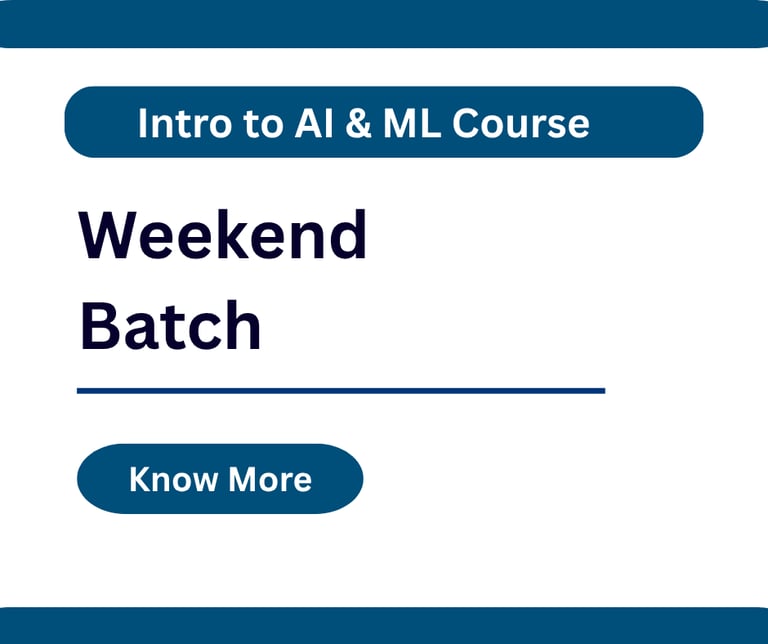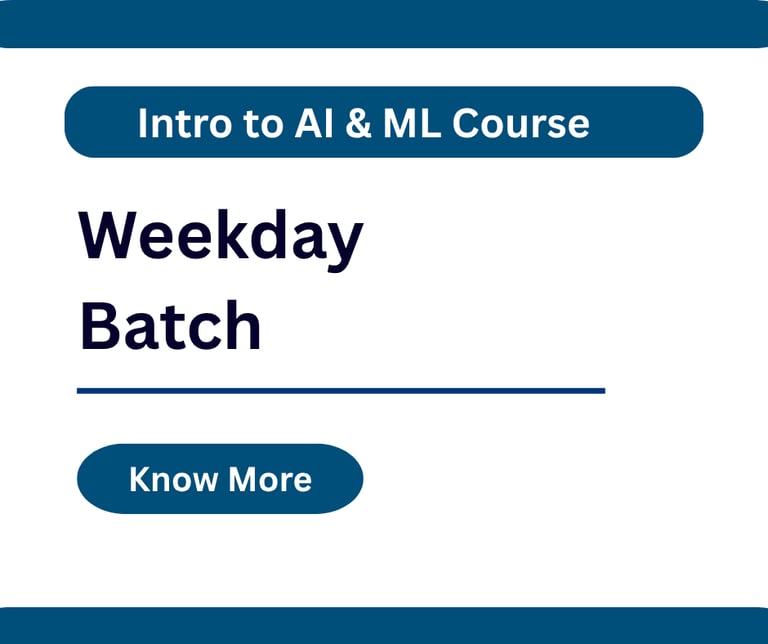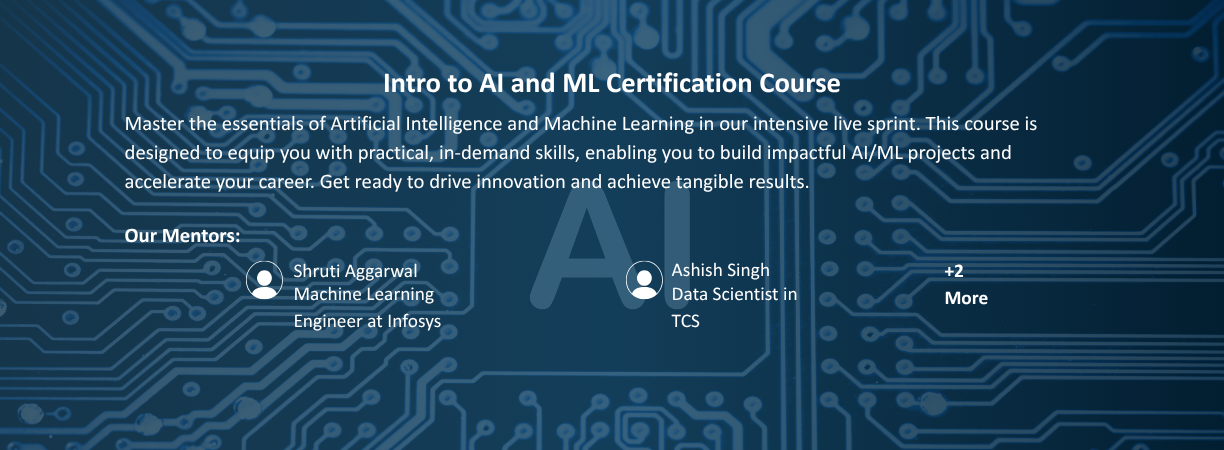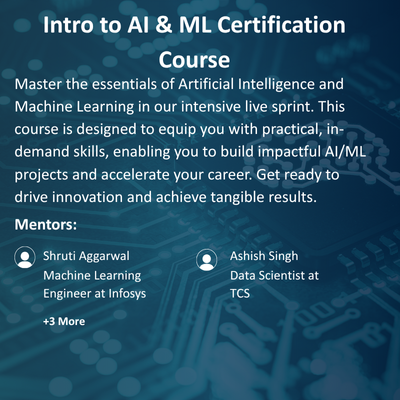







Major Industry Recruiters








Major Industry Recruiters
Course Description:
The Intro to AI and ML Certification Training is designed to introduce participants to the fundamentals of Artificial Intelligence (AI) and Machine Learning (ML). As AI and ML continue to revolutionize industries and drive innovation, this course provides a solid foundation in the principles and applications of these technologies. Whether you are an aspiring data scientist, software developer, or business professional, this course will equip you with the knowledge and skills necessary to understand and apply AI and ML in real-world scenarios. The course covers the core concepts of machine learning algorithms, data preprocessing, model evaluation, and hands-on practical applications using popular AI/ML tools.
Course Objectives:
By the end of this training, participants will be able to:
Understand the fundamental concepts of AI and ML, including supervised, unsupervised, and reinforcement learning.
Explore key AI/ML algorithms such as linear regression, decision trees, and clustering techniques.
Learn how to process and clean data to prepare it for machine learning models.
Gain experience with essential machine learning tools and libraries like Python, NumPy, and Scikit-Learn.
Understand the importance of model evaluation metrics and how to improve model performance.
Implement and apply machine learning models to solve basic real-world problems.
Understand ethical considerations in AI and ML applications.
Course Module:
Module 1: Introduction to AI and ML
What is Artificial Intelligence? Definitions and applications.
Types of AI: Weak AI vs. Strong AI.
Understanding Machine Learning: What it is and why it’s important.
Real-world applications of AI and ML in various industries (e.g., healthcare, finance, e-commerce, and robotics).
Module 2: Machine Learning Fundamentals
Types of Machine Learning: Supervised, Unsupervised, and Reinforcement Learning.
Key machine learning concepts: Algorithms, models, training data, and features.
Overview of popular ML techniques and algorithms.
Linear regression, logistic regression.
Decision trees and random forests.
Clustering techniques: K-means, hierarchical clustering.
Data preprocessing: Importance of cleaning and transforming data.
Module 3: Supervised Learning
Overview of supervised learning algorithms.
Linear Regression: Basic principles, implementation, and evaluation.
Classification Algorithms: Logistic regression, decision trees, and support vector machines (SVM).
Overfitting and underfitting: How to recognize and deal with them.
Model evaluation techniques: Cross-validation, confusion matrix, and ROC curve.
Module 4: Unsupervised Learning
Overview of unsupervised learning.
Clustering: K-means clustering, hierarchical clustering, DBSCAN.
Dimensionality reduction: Principal Component Analysis (PCA).
Application of unsupervised learning in customer segmentation, anomaly detection, etc.
Module 5: Reinforcement Learning
Introduction to reinforcement learning.
Key concepts: Agent, environment, rewards, and actions.
Overview of Q-learning and Markov decision processes.
Applications of reinforcement learning in gaming, robotics, and recommendation systems.
Module 6: Data Preprocessing and Feature Engineering
The importance of clean and well-structured data.
Handling missing values, encoding categorical variables, and scaling features.
Feature engineering techniques: Creating meaningful features from raw data.
Dealing with imbalanced datasets and class imbalance.
Module 7: Model Evaluation and Improvement
Understanding evaluation metrics for regression and classification models (e.g., accuracy, precision, recall, F1 score).
Hyperparameter tuning and optimization techniques (e.g., GridSearchCV, RandomizedSearchCV).
Bias-variance tradeoff and model complexity.
Cross-validation techniques and how to choose the best model.
Module 8: Practical Applications of AI and ML
Building your first machine learning model with Scikit-Learn.
Hands-on exercises: Implementing classification and regression models.
Solving real-world problems: Predicting house prices, classifying emails, and clustering data.
Understanding the importance of model interpretability and transparency.
Module 9: AI and ML Tools and Libraries
Introduction to Python for AI and ML: Setting up the environment.
Using libraries like NumPy, Pandas, Matplotlib, and Scikit-learn for data analysis and modeling.
Introduction to deep learning libraries: TensorFlow, Keras, and PyTorch.
Jupyter notebooks for running and testing ML models interactively.
Module 10: Ethical Considerations in AI and ML
Understanding the ethical challenges in AI and ML (e.g., fairness, transparency, accountability).
The importance of bias detection and mitigation in ML models.
Privacy and security concerns in AI-driven applications.
Responsible AI practices and ethical frameworks.
Module 11: Preparing for the AI and ML Certification Exam
Overview of certification exam format.
Practice exercises and review of key concepts.
Study tips and resources for further learning.

Upcoming Batches: Choose as per Your Requirement




Our Mentors:
Shruti Aggarwal
Machine Learning Engineering in Infosys
Asish Singh
Data Scientist at TCS
Neha Singh
AI Engineer in TCS
Akshay Jain
AI/ML Engineer ex-Wipro
Our Mentors:
Shruti Aggarwal
Machine Learning Engineer at Infosys
Ashish Singh
Data Scientist at TCS
Neha Singh
AI Engineer in TCS
AI/ML Engineer ex-Wipro
Akshay Jain
Our Alumni Work at Top Companies
FAQs – AI & ML Certification at GIMIT
1. Who should attend this course?
Aspiring data scientists, machine learning engineers, and AI enthusiasts.
Software developers and engineers looking to expand their knowledge into AI and ML.
Business professionals who want to understand the basics of AI and ML for decision-making.
Anyone interested in pursuing a career in AI, data science, or machine learning.
2. What will I learn in this course?
You will learn the foundational concepts of AI and machine learning, including supervised and unsupervised learning, model evaluation, data preprocessing, and popular algorithms. You will also gain hands-on experience with ML tools and libraries like Python, Scikit-learn, and TensorFlow.
3. What are the prerequisites for this course?
Basic knowledge of programming, especially in Python, will be helpful. Familiarity with high school-level mathematics, particularly statistics and algebra, will also be beneficial but not mandatory.
4. How long is the Intro to AI and ML Training?
The course typically lasts 3-5 days, depending on the depth of the content and practical exercises.
5. Is the course available online?
Yes, this course is available in both in-person and live online formats, allowing flexibility for participants to attend from anywhere.
6. Will I receive any study materials?
Yes, participants will receive comprehensive course materials, including lecture slides, example code, exercises, and further reading materials. We also provide access to online resources and practice datasets for hands-on learning.
7. How will this course benefit my career?
AI and machine learning are rapidly growing fields with immense potential for career advancement. This course will provide you with the foundational knowledge required to start working with AI/ML technologies, enhancing your employability in the tech and data science sectors.
8. What is the AI and ML Certification?
The certification validates your understanding of the core concepts of AI and machine learning. Upon successful completion of the course and exam, you will receive a certification from GIMIT Education Institute, which can help advance your career prospects in AI and ML-related roles.
9. How can I register for the course?
You can register for the course through our website or by contacting our team directly. We offer both scheduled sessions and customized training for organizations.
10. Will I have hands-on experience during the course?
Yes, the course includes practical, hands-on exercises where you will implement machine learning models, work with datasets, and solve real-world problems using AI/ML techniques.
11. How do I prepare for the certification exam?
The course includes review sessions, practice exercises, and exam preparation resources to ensure you are well-prepared for the certification exam.
12. What tools and libraries will I use in this course?
You will work with Python, Scikit-learn, Pandas, NumPy, Matplotlib, and TensorFlow. These tools are essential for building and evaluating machine learning models.





